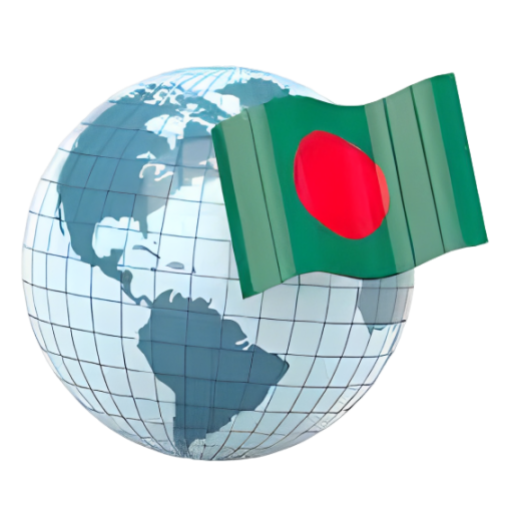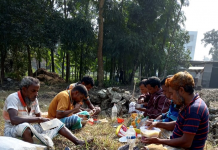There are broadly four categories of Bangladeshis living in Malaysia: skilled expatriate workers and professionals; people under the second home programme; students at local tertiary institutions; and unskilled workers or labourers. My focus in this article is on the fourth category of migrants, who are often exploited and “othered” by the host society and forced to live in precarious circumstances and abject conditions.
Bangladeshi unskilled migrant workers started coming to Malaysia in the 1980s when industrialisation began in the Malay Peninsula. But their numbers began to grow significantly after the two governments signed a memorandum of agreement to recruit workers on a regular yearly basis in 1994 and set up agencies in both countries to facilitate the process. Workers from Bangladesh generally come to Malaysia to avoid poverty and unemployment back home and earn a reasonable income to support themselves and their families left behind. Although, of late, the economy of Bangladesh has been growing steadily, Malaysia is still considered a relatively more prosperous country and the place to be by Bangladeshis of all walks of life, especially the working class.
However, the glitz and glamour of the Malaysian economy does not necessarily benefit the migrant workers in the country. They remain perpetual victims of the corrupt systems in the two countries as, unfortunately, bribery and fraud are rife among the political and administrative elites in both Bangladesh and Malaysia. This eventually creates a web of abuse and oppression for the workers from the moment they reach out to the manpower agencies in the home country.
Every migrant worker pays an average of RM 6,000 (AUD 2,000) to the agent in Bangladesh to arrange a work visa and facilitate their arrival and employment in Malaysia. Malaysia’s labour laws are fairly rigid as workers are required to work for one employer only during their visa period, which could be for a maximum of six years. Come hell or high water, these workers are not allowed to change their employer negotiated at the outset by the agents on the two sides. This creates considerable uncertainty for the workers and an opportunity for manipulation by the agents, employers and some corrupt politicians and immigration officers in Malaysia.
Sometimes, these employing companies can be fictitious, as corrupt businesses in Malaysia, in cooperation with the dishonest staff of relevant ministries, come up with documents to create a company on paper but with no physical existence. This means that the poor workers who had spent their money, probably selling the last bit of their parental inheritance, have been duped into a life of potential homelessness. Once I saw a whole group of Bangladeshi workers huddling under a flyover in Kuala Lumpur because their agents had abandoned them on arrival, and they had nowhere to go. Sometimes, the Bangladesh High Commission in Kuala Lumpur tries to help out these deceived workers, but it’s difficult for them to extend any concrete help in finding a job because of the overall apathy of the Malaysian people and self-serving politicians toward Bangladeshi workers.
The salary of these workers in Malaysia is nothing compared to what their agents promise them in Dhaka. As a result, they live in deplorable conditions, sometimes four or five packed in a single room. The landlords and shopowners also exploit these wretched workers. They often have to pay exorbitant rent to secure shelter for themselves and cough up higher prices than usual for their purchases, only because they are foreigners. They are also subjected to constant harassment and extortion by the police in the name of checking their immigration papers, and sometimes gang members prey on them for money while returning from work in the late afternoon or evening. They have nowhere to go to seek justice for this price gouging, deceit, police persecution and occasional violence, as the entire system is rigged against them. They slog away to build Malaysia and bring prosperity to the host nation in appreciation for the opportunity to work and make a living in the country, but they get nothing but scorn, insult and indifference in return. Malaysia desperately needs these workers to build its economy, but ironically, the people remain distant and disdainful towards them only because they are warga asing, orang Bangla and pendatang. It’s an outrageous expression of raw and obscene loathing by a group of haves toward the have-nots who have come from another country to make an honest living.
Sometimes, Bangladeshi migrant workers become casualties of the strict visa system administered by the Malaysian government. As I mentioned earlier, workers must work for one employer for their entire stay in Malaysia. Obviously, this ensures total leverage of the local employer over their migrant employees. While the Malaysian workers are free to look for better opportunities and move at will, migrant workers are forced into a life of “incarceration.” Sometimes, if the relationship with the boss or the conditions at the workplace becomes unbearable and the worker decides to move to another company, he (the majority are male workers) instantly becomes illegal in Malaysia. So the large number of unlawful Bangladeshi workers we often hear about in the media lost their status in the country because they had violated their visa condition by moving to a new employer without prior approval from the immigration department.
Bangladeshi migrant workers are often obliged to work in dirty, dangerous and difficult sectors shunned by the local workforce. These include the manufacturing, construction, service and plantation sectors. I have seen them working as cleaners, menial workers, bricklayers, busboys, petrol pump attendants, and other low-paid jobs. Being predominantly Muslims, they prefer to work with Malay employers, but, surprisingly, the Chinese employers favour Bangladeshi workers the most. Whenever there is a move from the government to cancel the visa of Bangladeshi workers for whatever political reason, it is the Chinese businesses that speak up and come to their aid. This is because Chinese employers think that Bangladeshi workers are the most sincere, devoted and hard-working group of foreign workers in the country.
So why are Bangladeshi migrant workers scorned, ostracised and exploited by Malaysians, especially Malays? Malays are very proud of their Islamic identity and often talk about the Ummah to bring the Muslim world into one fold. Therefore, shouldn’t they be supportive of their Muslim brothers, albeit from another country and culture? Shouldn’t they extend a helping hand to members of the faith when they are abused and maltreated in their homeland? I view Malays as inherently honest people—simple, welcoming and tolerant—but they are sometimes vulnerable to disinformation and propaganda campaigns by the influential segments of society. They respect their authorities to the extent that they can thrust almost anything on these humble and law-abiding people as long as it does not infringe on their ethnic “supremacy” and bumiputra rights.
This brings me to the crux of the argument, i.e., nation-building and how that negatively impacts migrant workers from Bangladesh. Malaysia has been an independent country for over sixty years, but it has yet to attain a wholesome national identity. Malaysian society is still fragmented along ethnic lines because of its racially hierarchic policies. Malays and Bumiputras form the majority with about 67 per cent of the population, while Chinese constitute 24 per cent and Indians roughly 8 per cent. Malaysia’s affirmative action policies favour Malays. Their demographic advantage ensures their political hegemony over the minority groups. Malays are the principal beneficiaries of the New Economic Policy (NEP) adopted in the wake of the racial riots of 13 May 1969. Islam, the Malay language and Malay culture form the asas of the national culture. Malaysian constitution acknowledges Malay preeminence by relegating its minority citizens to lesser members of society. Only a Malay can be the country’s Prime Minister, his deputy, the chief of army and the chief of police. This has resulted in considerable distrust, resentment and simmering hatred among the diverse ethnic groups in the country. Since Bangladeshis are predominantly Muslims, favouring them by Malays would create further suspicion and resentment among the minorities that they are trying to increase their number by bringing in more people of their faith. Therefore, to appease the non-Malays and create a false sense of collectivity among its multicultural population, the unscrupulous leaders and their cronies undertake various measures to disparage Bangladeshi workers and project them as unworthy of association with Malays. To hoodwink the non-Malays into thinking that there is a fellowship and solidarity among the country’s multiethnic citizens, the establishment media and institutions vilify these workers in numerous ways. They create negative stereotypes and spread false information about them to suggest that Bangladeshis are not only poor and, therefore, dirty and bad Muslims but also frauds and criminals. They deserve to be sent back home or thrown into jail for their shifty and slippery ways, but because of the munificence of Malaysians, they are allowed to work and make a living in the country. Thus, through certain deliberate moves by powers that be, Bangladeshi migrant workers are reduced to the “panchamas” of Malaysian society—a labour force that Malaysia needs sorely but that they ought to demonise so that it can create a false sense of homogeneity among the polity. Migrant workers suffer a similar fate in many countries, but in Malaysia, it happens through Big Brother’s measured and proactive intervention. The nation wants to achieve the unity that has eluded them because of its glaring hierarchic and hegemonic policies by reducing a helpless group of migrant workers into its collective victim. It’s a ruse that will never address the actual problem of nation-building but it, nonetheless, brings untold suffering to a community of people who are pivotal to the country’s success story as a “miracle” economy in the Islamic world and the Global South.

Professor Mohammad A. Quayum (PhD, Flinders University) has published numerous books and articles in American literature, Asian Anglophone literature and Bengali literature, with globally leading publishers such as Brill, Macmillan, Orient Longman, Pearson Education, Penguin Books, Peter Lang, Routledge and Springer. He is the founder of Asiatic: An International Journal of Asian Literatures, Cultures and Englishes and former co-editor of World Literature Written in English (OUP, Singapore). He was a Visiting Professor/Fellow at the ASRC (India; on a Singapore USIS Fellowship), Jadavpur University (India), Singapore Management University, the State University of New York at Binghamton and the University of South Australia. He lived and taught at tertiary institutions in Malaysia and Singapore for over two decades and is currently with Flinders University, South Australia.




